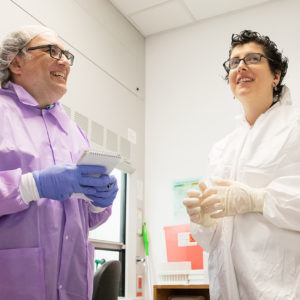Aging Dementia
Helping People With Dementia Live Well
Republic of Ireland | Northern Ireland | 2006 - 2015
People with dementia should be able to get the care they need and for as long as they can while living at home, where they can stay connected to family and community.
In pursuit of that goal, our grantmaking in the Republic of Ireland and Northern Ireland focused on informing policy, improving services, enabling people with dementia to have a say in their care and treatment, and reducing the associated stigma. In addition, support was provided to help family caregivers.
For one of our final big bets, we made a $177 million investment in two longtime grantees — UC San Francisco and Trinity College Dublin — to create the Global Brain Health Institute (GBHI). This groundbreaking venture seeks to stem the precipitous rise in dementia by creating a generation of leaders around the world who have the knowledge, skills and drive to change both the practice of dementia care and the public health and societal forces that affect brain health.
A New Path Forward
Because 50,000 Irish people have dementia, a number that may triple by 2041, we addressed current needs and planning for the future.
Promoting Research, Informing Policy
Support for quality research and analysis —such as Creating Excellence in Dementia Care—helped inform the government of the Republic of Ireland’s 2014 National Dementia Strategy.
Improving Services
In the Republic of Ireland, Atlantic grantee Genio successfully demonstrated new service models to enable people with dementia to live in their own homes and to be active and valued members of their local communities. As a result, these approaches were subsequently integrated into Irish National Dementia Strategy.
Changing Mindsets
Atlantic supported media and marketing campaigns to bring a new and more positive view of dementia and the prospects for positive independent living to a wide national television and radio audience.
Here’s Who’s Helping Write the Next Chapter in This Continuing Story
Why We Must Do All We Can to Help People Live Well with Dementia
Summaries of Case Studies, Evaluations & Reports
-
Developing and Implementing Dementia Policy in Ireland
Source: Centre for Economic and Social Research on Dementia, NUI Galway
This report is a follow up to Creating Excellence in Dementia Care (2012), which informed Ireland’s National Dementia Strategy. It reflects on progress since 2012 on various aspects of care for people with dementia in Ireland and internationally with a view to informing future developments in…
Resource type: Research Report
-
Paying Dividends: A Report on The Atlantic Philanthropies Investment in Dementia in Ireland
Source: National University of Ireland Galway
This study examines Atlantic’s investments in the Republic of Ireland to improve dementia care, boost research and encourage changes in policy, and how these efforts have impacted the lives of people with dementia and their families. The study focuses on investments—made between 2011 and 2015—to provide support…
Resource type: Research Report
-
The Irish National Dementia Strategy
Source: Department of Health Ireland
Dementia affects about 50,000 people in Ireland today and that number is expected to triple by 2041. For the first time, the Republic of Ireland has published a centralised and coordinated national strategy aimed at improving the lives of people living with dementia. The strategy's…
Resource type: Research Report
-
Genio Dementia Programme – Year 1
Source: Irish Centre for Social Gerontology
Dementia in the Republic of Ireland is associated with poor diagnosis, stigma and lack of awareness among the general public. Not surprisingly, service provision has been, as a consequence, badly structured, poorly funded and weakly integrated. Genio, an Atlantic grantee, is working to develop and test…
Resource type: Evaluation
-
Northern Ireland Audit of Dementia Care in Acute Hospitals 2015
Approximately 21-29% of adults aged over 70 years admitted to Northern Ireland hospitals have dementia. Admission to hospital can be a stressful and distressing experience for these patients. This audit report examines the quality of dementia care in all 12 acute hospitals in Northern Ireland, from…
Resource type: Research Report
-
Robinson and McGuinness Announce £58 Million Investment
First Minister the Rt. Hon. Peter D. Robinson MLA and the deputy First Minister Martin McGuinness MLA have announced a £58 million investment to deliver improved services for parents, shared education and support for people with dementia and their carers. The total value of the…
Resource type: News
-
Creating Excellence in Dementia Care: A Research Review for Ireland’s National Dementia Strategy
Source: The School of Social Work and Social Policy, Trinity College, Dublin and The Irish Centre for Social Gerontology, NUIG
More people in Ireland have dementia than cancer or heart disease yet it has been a largely invisible and underfunded health issue, according to a new report by Suzanne Cahill and Maria Pierce from the School of Social Work and Social Policy, Trinity College, Dublin;…
Resource type: Research Report
-
Future Dementia Care in Ireland: Sharing the Evidence to Mobilise Action
Source: The School of Social Work and Social Policy, Trinity College, Dublin and The Irish Centre for Social Gerontology, NUIG
This practical guide aims to answer questions and increase public awareness about dementia care in Ireland. Issues addressed include: What is dementia? How many people in Ireland have dementia? What are the costs of dementia? What is Ireland doing in its campaign on dementia? What…
Resource type: Research Report
-
Irish National Audit of Dementia Care in Acute Hospitals
Source: The Irish National Audit of Dementia
Admission to an acute hospital can be distressing and disorienting for a person with dementia. These hospitals currently lack standards for assessing and caring for the particular needs of patients with dementia, even though dementia may affect up to 25% of hospital in-patients at any…
Resource type: Research Report
-
Republic of Ireland
This book tells the story of how The Atlantic Philanthropies’ 30 years of investments had an extraordinary impact on the Republic of Ireland—from helping breathe life into the nation’s university system and its research capabilities, to supporting major advances in human rights, and spurring the…
Resource type: Insight
-
Northern Ireland
This book tells the story of Atlantic’s grantmaking in Northern Ireland, where it helped promote peace, reshape education, improve public services, and strengthen organizations to promote and protect people’s rights.
Resource type: Insight
You Might Also Be Interested In
-
Global Brain Health Institute
This groundbreaking venture seeks to reduce dramatically the number of older people who develop dementia, which consumes not just those with this disease, but their families and caregivers as well.
-
Age-Friendly Communities & Policies
Atlantic advocated for adoption of age-friendly policies and practices that recognize older individuals as people who still have much to contribute to society.
-
Palliative Care
Palliative care provides great comfort and we have worked to make it widely available.
-
Aging Research
Atlantic has supported research to better understand the needs of an aging population.






